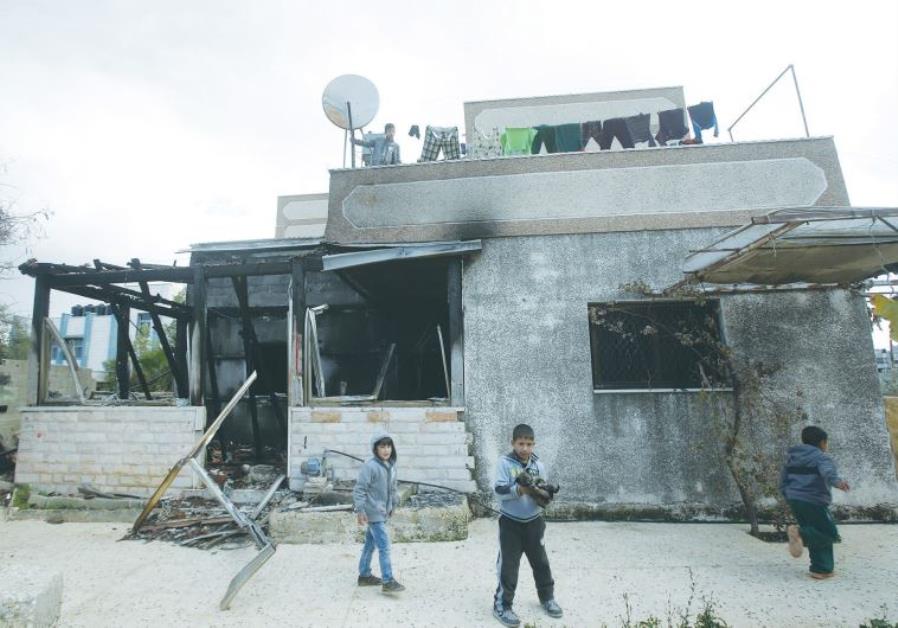Court: Key confessions of Jewish terror defendant valid, minor’s rejected

Palestinian children play in the yard of the Dawabsha family home in Duma in December, 2015. (photo credit: REUTERS)
The Lod District Court confirmed the validity of key confessions of the main defendant in the Duma alleged Jewish terror case which give the prosecution a strong chance to convict, while disqualifying all key confessions given by the minor-defendant in the case.
The mixed blockbuster decision, which will have far reaching consequences, did disqualify some confessions of the main defendant during and 36 hours after enhanced interrogation was used on him.
The Justice Ministry and the Shin Bet have a strong lead toward winning their flagship case against the main defendant, Amiram Ben Uliel, for fighting Jewish terror – though as the court declined to rule on whether the Shin Bet tortured or used legal enhanced interrogation – future rough treatment of Jewish extremists is still up in the air.
Regarding the minor-defendant, the decision means that while he may still face convictions for lesser price tag attacks, he has a strong chance of acquittal from the Duma case.
The July 2015 arson terror attack which killed three members of the Palestinian Dawabshe family in Duma and the Shin Bet’s admitted enhanced interrogations of two Jewish defendants created convulsions in the region and within the Israeli political establishment.
Until now, there were two stages to the saga.
In the first stage of January 2016, the prosecution filed an indictment against Amiram Ben Uliel for murdering the Dawabshe’s and against a minor, whose name is under gag order, for conspiracy in planning the murder and other “price tag”-type crimes, though all had agreed that the minor ultimately did not take part in the arson.
In the second stage since then, the right-wing legal advocacy group Honenu and the defendants had implied that the state was using a gag order on the case’s proceedings to conceal that it tortured the defendants to obtain false confessions.
Recently, parents of the defendants also leaked that the state had suddenly agreed to toss out confessions of the defendants from the time period in which the Shin Bet used enhanced interrogation on them.
But the Post learned the prosecution’s counter-narrative on Monday.
Essentially, the prosecution believed the case would be a clear-cut conviction with little public controversy if the defendants were Palestinian and that all of the uproar is about their being Jewish and their supporters believing Jews committing the crimes they perpetrated should get treated better than Palestinians.
Regarding the minor, the prosecution’s narrative was that much of his confession was given to an undercover agent posing as a fellow prisoner prior to the enhanced interrogation.
Also, it would say that the minor had multiple stages of interrogation with the Shin Bet – first remaining mostly silent, then volunteering details, then returning to remaining silent – all of which were also before the enhanced interrogation stage.
Regarding Ben Uliel, the Post learned that he not only refused to cooperate, but that at first he did not utter a single word for 17 days.
Next, Honenu had said that the Shin Bet abused Israeli law’s permission to use enhanced interrogation to help avoid a future ticking bomb style attack, and instead used it to try to get a confession of a prior alleged crime.
The prosecution’s view was that enhanced interrogation was used on the defendants when the Shin Bet believed that they were part of an active cell which might carry out more attacks in addition to Duma, and not merely to obtain confessions about the past.
This would be exactly the kind of ticking bomb impending attack the High Court of Justice recently said justifies enhanced interrogation.
In any case, the prosecution’s view was that throughout the case it stated it would only use the confessions from before and after the enhanced interrogation and not from the statements that were given in the midst of it.
Regarding the statements after the enhanced interrogation stage, the Post learned that over four days Ben Uliel reconstructed the crime at the scene and provided numerous tiny details relating to the crime that it did not know about, that only the perpetrator could have known and which it later confirmed.
Further, the Post learned that there is a video of the post-enhanced interrogation confession stage which has been provided to the court, and that Ben Uliel can be seen acting calmly and self-volunteering information without even being asked.
While the defense viewed the post-enhanced interrogation stage as already tainted by the psychological impact of what it calls torture, the prosecution’s view was that these stages were separate and the post-enhanced interrogation confessions can be used.
Moreover, the Post has learned that narratives given by the minor and Ben Uliel are consistent, such that it would be an incredible coincidence if they both described the same crime which in fact occurred, but had nothing to do with it.
Ultimately, the court found that the prosecution’s narrative regarding the confessions was more credible regarding Ben Uliel, but not credible regarding the minor. The prosecution told the Post though that it still believed it could convict the minor in the Duma case.
However, the Post has learned that the defense to date has only attacked the confessions admissibility, whether they can be used as evidence at all, but not their credibility – whether they are strong or weak evidence. This means the defense could still attack their credibility at a later stage, though now it will be an uphill battle.





Comments are closed.